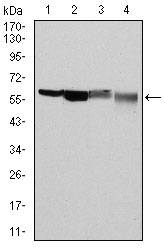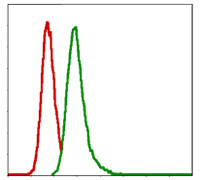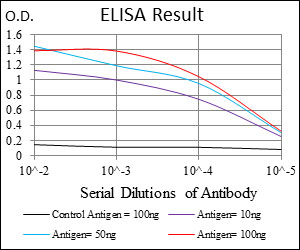G6PD Monoclonal Antibody
- Catalog No.:YM0291
- Applications:WB;IHC;IF;FCM;ELISA
- Reactivity:Human
- Target:
- G6PD
- Fields:
- >>Pentose phosphate pathway;>>Glutathione metabolism;>>Metabolic pathways;>>Carbon metabolism;>>Central carbon metabolism in cancer;>>Diabetic cardiomyopathy
- Gene Name:
- G6PD
- Protein Name:
- Glucose-6-phosphate 1-dehydrogenase
- Human Gene Id:
- 2539
- Human Swiss Prot No:
- P11413
- Immunogen:
- Purified recombinant fragment of human G6PD expressed in E. Coli.
- Specificity:
- G6PD Monoclonal Antibody detects endogenous levels of G6PD protein.
- Formulation:
- Liquid in PBS containing 50% glycerol, 0.5% BSA and 0.02% sodium azide.
- Source:
- Monoclonal, Mouse
- Dilution:
- WB 1:500 - 1:2000. IHC 1:200 - 1:1000. Flow cytometry: 1:200 - 1:400. ELISA: 1:10000.. IF 1:50-200
- Purification:
- Affinity purification
- Storage Stability:
- -15°C to -25°C/1 year(Do not lower than -25°C)
- Other Name:
- G6PD;Glucose-6-phosphate 1-dehydrogenase;G6PD
- Molecular Weight(Da):
- 59kD
- References:
- 1. Science. 2009 Dec 11;326(5959):1546-9.
2. Immunol Invest. 2009;38(6):551-9.
- Background:
- glucose-6-phosphate dehydrogenase(G6PD) Homo sapiens This gene encodes glucose-6-phosphate dehydrogenase. This protein is a cytosolic enzyme encoded by a housekeeping X-linked gene whose main function is to produce NADPH, a key electron donor in the defense against oxidizing agents and in reductive biosynthetic reactions. G6PD is remarkable for its genetic diversity. Many variants of G6PD, mostly produced from missense mutations, have been described with wide ranging levels of enzyme activity and associated clinical symptoms. G6PD deficiency may cause neonatal jaundice, acute hemolysis, or severe chronic non-spherocytic hemolytic anemia. Two transcript variants encoding different isoforms have been found for this gene. [provided by RefSeq, Jul 2008],
- Function:
- catalytic activity:D-glucose 6-phosphate + NADP(+) = D-glucono-1,5-lactone 6-phosphate + NADPH.,disease:Defects in G6PD are the cause of chronic non-spherocytic hemolytic anemia (CNSHA) [MIM:305900]. Deficiency of G6PD is associated with hemolytic anemia in two different situations. First, in areas in which malaria has been endemic, G6PD-deficiency alleles have reached high frequencies (1% to 50%) and deficient individuals, though essentially asymptomatic in the steady state, have a high risk of acute hemolytic attacks. Secondly, sporadic cases of G6PD deficiency occur at a very low frequencies, and they usually present a more severe phenotype. Several types of CNSHA are recognized. Class-I variants are associated with severe NSHA; class-II have an activity <10% of normal; class-III have an activity of 10% to 60% of normal; class-IV have near normal activity.,function:Produces pentose su
- Subcellular Location:
- Cytoplasm, cytosol . Membrane; Peripheral membrane protein .
- Expression:
- Isoform Long is found in lymphoblasts, granulocytes and sperm.
- June 19-2018
- WESTERN IMMUNOBLOTTING PROTOCOL
- June 19-2018
- IMMUNOHISTOCHEMISTRY-PARAFFIN PROTOCOL
- June 19-2018
- IMMUNOFLUORESCENCE PROTOCOL
- September 08-2020
- FLOW-CYTOMEYRT-PROTOCOL
- May 20-2022
- Cell-Based ELISA│解您多样本WB检测之困扰
- July 13-2018
- CELL-BASED-ELISA-PROTOCOL-FOR-ACETYL-PROTEIN
- July 13-2018
- CELL-BASED-ELISA-PROTOCOL-FOR-PHOSPHO-PROTEIN
- July 13-2018
- Antibody-FAQs
- Products Images

- Western Blot analysis using G6PD Monoclonal Antibody against HeLa (1), MCF-7 (2), Jurkat (3) and K562 (4) cell lysate.

- Immunohistochemistry analysis of paraffin-embedded ovarian cancer tissues with DAB staining using G6PD Monoclonal Antibody.

- Flow cytometric analysis of MCF-7 cells using G6PD Monoclonal Antibody (green) and negative control (red).




